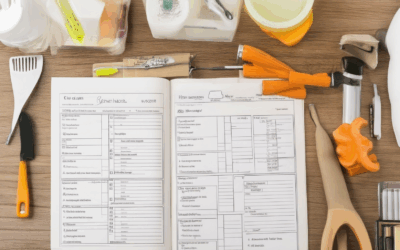Are you new to home health care and feeling overwhelmed by the complexities of caring for a loved one? Creating a comprehensive home care checklist for beginners can be a game-changer, helping you stay organized, informed, and prepared for the challenges ahead. Whether you’re a novice caregiver or someone stepping into a new role, having a well-structured checklist ensures that no task is overlooked and everyone involved remains safe and supported.
Key Takeaways
– Declutter and Organize: Create a safe, clutter-free space to enhance functionality and accessibility.
– Inspect and Secure Floors: Ensure floors are stable and free from tripping hazards.
– Check for Safety Risks: Identify and mitigate potential dangers in your home.
– Prepare Kitchens and Bathrooms: Ensure these spaces are clean, safe, and equipped for daily use.
– Understand Home Care Services: Recognize the range of support available, from personal care to household tasks.
– Develop Essential Skills: Cultivate empathy, communication, and organizational abilities for effective caregiving.
– Stay Informed and Prepared: Keep emergency kits ready and stay updated on care recipient needs.

How to Create a Caregiver Checklist
Creating a comprehensive caregiver checklist can help organize tasks and ensure nothing is missed. Below is a detailed guide to building an effective checklist tailored for your needs.
- Communication and Documentation
- Medical Records: Copy important documents like prescriptions, medical history, and insurance information.
- Contact List: Include names, phone numbers, and email addresses of healthcare providers, family members, and emergency contacts.
- Daily Needs
- Meal Planning: Schedule meals and snacks according to the individual’s dietary needs and preferences.
- Grocery List: Prepare a shopping list with all necessary items, including personal care products and household supplies.
- Schedule: Outline daily routines, including wake-up times, meal times, and activity schedules.
- Health and Safety
- Emergency Contacts: List family members, friends, and local emergency services (e.g., police, fire department).
- Health Monitoring: Include tools like thermometers, blood pressure monitors, and glucose meters.
- Safety Devices: Check smoke detectors, carbon monoxide detectors, and fire extinguishers.
- Home Maintenance
- Chore List: Break down tasks like laundry, cleaning, and yard work into manageable steps.
- Appliance Checks: Schedule regular inspections of major appliances like HVAC systems and plumbing.
- Personal Care
- Hygiene Products: Stockpile essentials like toothbrushes, toothpaste, and skincare items.
- Clothing: Organize clothing based on the season and daily needs.
- Mobility Aids: Ensure accessibility items like walkers or canes are readily available.
- Mental Health and Wellness
- Support Resources: Include a list of counseling services, support groups, and mental health apps.
- Stress Relief: Add activities like reading, meditation, or hobbies to reduce stress.
- Financial Matters
- Budget Planner: Track monthly expenses and allocate funds for groceries, utilities, and medical bills.
- Legal Documents: Keep copies of wills, powers of attorney, and healthcare proxies handy.
- Technology and Tools
- Appointments: Schedule and confirm doctor’s appointments, therapy sessions, and other medical appointments.
- Medical Alert Systems: Ensure the system is charged and ready to use in case of emergencies.
- Travel and Outings
- Travel Plan: Outline destinations, dates, and times for planned outings.
- Emergency Kit: Pack a bag with essentials like medications, water, snacks, and first aid supplies.
- Miscellaneous
- First Aid Kit: Keep a well-stocked kit with bandages, antiseptics, and over-the-counter medications.
- Durable Medical Equipment: Store items like wheelchairs, prosthetics, or other specialized gear.
What Are Caregivers Not Allowed to Do?
Caregivers have a responsibility to provide compassionate and professional care while respecting boundaries and legal standards. Here are some actions caregivers must avoid:
- Sharing Private Information Without Consent: Disclosing sensitive details about a client’s health, finances, or personal life without explicit permission is strictly prohibited.
- Using Inappropriate Language: Harassment, discrimination, or offensive language directed at a client is unacceptable and may lead to disciplinary action.
- Neglecting Client Needs: Failing to provide necessary care, including physical, emotional, or psychological support, can result in serious consequences.
- Abusing Authority: Misusing power or taking unfair advantage of a client’s dependency for personal gain is a violation of trust.
- Failing to Follow Care Plans: Deviating from prescribed treatment or care protocols without proper authorization can compromise the client’s well-being.
- Emotional Manipulation: Pushing personal beliefs or causing emotional distress through words or actions is unethical and against professional standards.
- Mishandling Medications: Incorrect administration or failure to adhere to prescribed schedules can lead to harm and legal repercussions.
- Exceeding Physical Boundaries: Unwarranted physical contact or advances can create an uncomfortable environment and violate professional ethics.
- Financial Exploitation: Using a client’s funds for personal use or coercing them into financial decisions is illegal and morally wrong.
- Disrespecting Advance Directives: Ignoring a client’s written wishes regarding end-of-life care without just cause is a breach of trust.
- Failing to Document Care Properly: Inadequate record-keeping can hinder effective care and lead to legal challenges.
- Reporting Violations: Failing to report observed misconduct by other caregivers can protect clients and maintain a safe environment.

What Should Caregivers Not Do?
- Overload the caregiver with excessive responsibilities, leading to burnout.
- Neglect personal self-care, resulting in physical and mental fatigue.
- Communicate poorly with the patient, leading to misunderstandings.
- Ignore the patient’s preferences, whether expressed or implied.

How to Prepare Your Home for Home Care
To ensure your home is ready for home care, follow these organized steps:
- Declutter Living Spaces : Start by clearing clutter from common areas. Remove unnecessary items to enhance safety and ease of movement.
- Inspect Flooring**: Check for loose carpets and secure them or remove them to prevent tripping risks. Use non-slip mats under throw rugs to maintain stability.
- Organize Storage Areas : Tidy up cabinets and drawers to make essentials easily accessible. This helps in maintaining a clean and functional environment.
- Check for Safety Hazards : Look for potential trip hazards like loose furniture or objects in hallways. Secure unstable items and ensure clear pathways.
- Examine Windows and Doors : Make sure they are secure and easy to operate. Ensure smooth opening and closing mechanisms for better accessibility.
- Kitchen Preparation : Clean and sanitize all surfaces. Inspect appliances and ensure they are functioning properly. Keep a fire extinguisher nearby and stock essential kitchen tools.
- Bathroom Safety : Remove slippery mats and ensure proper lighting. Fix any leaky pipes or fixtures to prevent accidents.
- Bedroom Organization : Arrange clothing and personal items neatly to facilitate easy access and movement around the room.
- Outdoor Preparation : Clear walkways, trim trees, and check the roof for loose shingles. Ensure outdoor areas are safe and accessible.
- Emergency Readiness : Keep a first aid kit, flashlight, and fire extinguisher handy. Have an emergency preparedness kit available for quick response.
By addressing these areas, you can create a safe and comfortable home environment tailored for home care needs.
What is Included in Home Care?
Home care encompasses a variety of services designed to assist individuals with daily tasks and overall well-being while residing in their own homes. These services aim to promote independence, comfort, and quality of life for those who may require support due to illness, injury, aging, or other conditions.
Key Components of Home Care
- Personal Care: Assistance with activities of daily living such as bathing, dressing, grooming, and mobility support.
- Household Chores: Help with cleaning, laundry, dishwashing, and general maintenance of the living environment.
- Cooking and Meal Preparation: Providing nutritious meals and assisting with grocery shopping and food preparation.
- Respite Care: Short-term relief for family caregivers, allowing them to take breaks while ensuring the client continues to receive care.
- Administrative Support: Assistance with managing bills, correspondence, and other paperwork.
- Medical Equipment Assistance: Help with setting up and maintaining medical devices or equipment prescribed by healthcare providers.
These services are tailored to meet the unique needs of each individual, ensuring personalized attention and a focus on maintaining a comfortable and safe home environment.

How to Be a Good Home Caregiver
Becoming a good home caregiver requires a combination of empathy, knowledge, and effective communication. Here’s a guide to help you excel in this role:
Key Qualities of a Good Home Caregiver
- Empathy and Compassion : Understand and share the individual’s feelings, needs, and experiences.
- Communication Skills : Effectively convey information and listen actively to ensure understanding.
- Patience : Remain calm and composed under pressure, especially during challenging situations.
- Reliability and Consistency : Be dependable and follow through on commitments.
- Positive Attitude : Maintain a hopeful outlook to boost the individual’s spirits.
- Time Management : Balance your own responsibilities with those of the person you’re caring for.
- Technical Proficiency : Know basic first aid and understand medical conditions relevant to the individual.
- Emotional Resilience : Manage stress and cope with difficult emotions effectively.
Practical Tips for Success
- Stay Informed : Keep updated on the individual’s health condition and any changes.
- Maintain Boundaries : Set clear limits to prevent burnout and ensure a healthy work-life balance.
- Advocate for the Individual : Speak up for their rights and ensure their wishes are respected.
- Seek Support Networks : Join support groups or attend workshops for caregivers to gain insights and reduce isolation.
- Document Everything : Keep detailed records of care activities, preferences, and significant events.
- Know When to Ask for Help : Don’t hesitate to reach out to family, friends, or professional services when needed.
Additional Resources
For more information and tools tailored to home caregivers, visit our Caregiving Resources page. Explore guides, checklists, and expert advice to enhance your caregiving skills.
Conclusion
Being a good home caregiver is a rewarding yet challenging role. By cultivating the right qualities and following these tips, you can provide compassionate and effective care. Remember to take care of yourself too, as this journey requires strength and resilience.




0 Comments